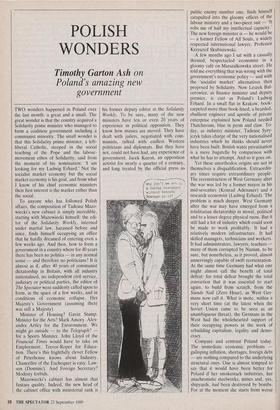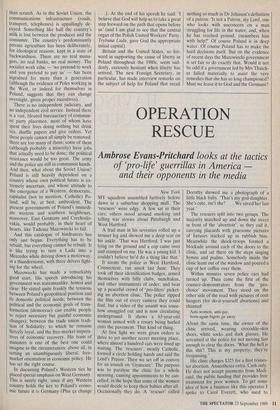POLISH WONDERS
Timothy Garton Ash on
Poland's amazing new government
TWO wonders happened in Poland over the last month: a great and a small. The great wonder is that the country acquired a Solidarity prime minister who managed to form a coalition government including a communist minority. The small wonder is that this Solidarity prime minister, a left- liberal Catholic, steeped in the social teaching of the Pope and the labour- movement ethos of Solidarity, said from the moment of his nomination: 'I am looking for my Ludwig Erhard.' Not the socialist market economy but the social market economy is his goal, and from what I know of his chief economic ministers their first interest is the market rather than the social.
To anyone who has followed Polish affairs, the composition of Tadeusz Mazo- wiecki's new cabinet is simply incredible, starting with Mazowiecki himself: the edi- tor of the Solidarity Weekly, interned under martial law, harassed before and since, finds himself occupying an office that he hardly dreamed of entering even a few weeks ago. And then, how to form a government in a country where for 40 years there has been no politics — in any normal sense — and therefore no politicians? It is almost as if, after 40 years of communist dictatorship in Britain, with all industry nationalised, no independent civil service, judiciary or political parties, the editor of The Spectator were suddenly called upon to form, in the space of a few weeks, and in conditions of economic collapse, Her Majesty's Government (assuming there was still a Majesty).
Minister of Housing? Gavin Stamp. Minister for the Arts? Mark Amory. Alex- andra Artley for the Environment. We might go outside — to the Telegraph? — for a Sports Minister. John Lloyd of the Financial Times would have to take on Employment. Trevor-Roper for Educa- tion. There's this frightfully clever Fellow of Peterhouse knows about Industry. Chancellor of the Exchequer is easy: Law- son (Dominic). And Foreign Secretary? Modesty forbids.
Mazowiecki's cabinet has almost that fantasy quality. Indeed, the new head of the cabinet office with ministerial rank is
his former deputy editor at the Solidarity Weekly. To be sure, many of the new ministers have ten or even 20 years of experience in political opposition. They know how masses are moved. They have dealt with jailers, negotiated with com- munists, talked with endless Western politicians and diplomats. But they have not, could not have had, any experience of government. Jacek Kuroii, an opposition activist for nearly a quarter of a century, and long treated by the official press as
public enemy number one, finds himself catapulted into the gloomy offices of the labour ministry and a two-piece suit — 'It robs me of half my intellectual capacity.' The new foreign minister is — he would be — a former Fellow of All Souls, a widely respected international lawyer, Professor Krzysztof Skubiszewski.
A few months ago I sat with a casually dressed, bespectacled economist in a gloomy café on Marszalkowska street. He told me everything that was wrong with the government's economic policy — and with the 'socialist market' alternatives then proposed by Solidarity. Now Leszek Bal- cerowicz, as finance minister and deputy premier, is cast as Poland's Ludwig Erhard. In a small flat in Krakow, book- carpeted more than book-lined, a bearded, ebullient engineer and apostle of private enterprise explained how Poland needed Thatcherism, blue in perm and claw. To- day, as industry minister, Tadeusz Syry- jczyk takes charge of the very nationalised industries which he thinks should never have been built. British water privatisation is a mere bagatelle by comparison with what he has to attempt. And so it goes on.
Yet these unorthodox origins are not in themselves a disqualification. Extraordin- ary times require extraordinary people. The reconstruction of West Germany after the war was led by a former mayor in his mid-seventies (Konrad Adenauer) and a research economist (Ludwig Erhard). The problem is much deeper. West Germany after the war may have emerged from a totalitarian dictatorship in moral, political and to a lesser degree physical ruins. But it still had a lot of industry which could soon be made to work profitably. It had a relatively modern infrastructure. It had skilled managers, technicians and workers. It had administrators, lawyers, teachers — many of them corrupted by Nazism, to be sure, but nonetheless, as it proved, almost unnervingly capable of swift reorientation. At the same time Germany had what one might almost call the benefit of total defeat: for total defeat brought the total conviction that it was essential to start again, to build from scratch, from the Stunde Null (Zero Hour), as West Ger- mans now call it. What is more, within a very short time (at the latest when the Soviet Union came to be seen as an unambiguous threat), the Germans in the West had the wholehearted support of their occupying powers in the work of rebuilding capitalism, legality and demo- cracy.
Compare and contrast Poland today. The immediate economic problems — galloping inflation, shortages, foreign debt — are nothing compared to the underlying structural ones. One is almost tempted to say that it would have been better for Poland if her smokestack industries, her anachronistic steelworks, mines and, yes, shipyards, had been destroyed by bombs. For at the moment she starts from worse
than scratch. As in the Soviet Union, the communications infrastructure (roads, transport, telephones) is appallingly de- cayed. Something like half the country's milk is lost between the producer and the consumer. The country's predominantly private agriculture has been deliberately, for ideological reasons, kept in a state of backwardness. There are no real mana- gers, no real banks, no real money. The socialist work ethic — 'we pretend to work and you pretend to pay us' — has been ingrained for more than a generation (although the evidence of Poles working in the West, or indeed for themselves in Poland, suggests that they can change overnight, given proper incentives).
There is no independent judiciary, and no independent civil service. Instead there is a vast, bloated bureaucracy of commun- ist party placemen, most of whom have spent their lives doing nothing but drink tea, shuffle papers and give orders. Yet these people cannot all simply be removed: there are too many of them; some of them (although probably a minority) have jobs that actually need to be done; the political resistance would be too great. The army and the police are still in communist hands. And then, what about the Soviet Union? Poland is still heavily dependent on a country whose own political future is ex- tremely uncertain, and whose attitude to the emergence of a Western, democratic, capitalist (not to mention, Catholic) Po- land, will be, at best, ambivalent. The present governments of Poland's immedi- ate western and southern neighbours, moreover, East Germany and Czechoslo- vakia, would probably, in their heart of hearts, like Tadeusz Mazowiecki to fail.
And this catalogue of hindrances has only just begun. Everything has to be rebuilt, but everything cannot be rebuilt. It Is like trying to turn a Lada into a Mercedes while driving down a motbrway, in a thunderstorm, with three drivers fight- ing for the wheel.
Mazowiecki has made a remarkably good start. His speech introducing his government was statesmanlike, honest and clear. He stated quite frankly the tensions between Poland's geopolitical position and its domestic political needs;. between the political and the economic goals of trans- formation' (democracY can enable people to reject necessary but painful economic changes); between the trade union tradi- tion of Solidarity, to which he remains fiercely loyal, and the free-market impera- tives of economic recovery. His team of ministers is one of the best one could imagine in the circumstances: above all, in setting an unambiguously liberal, free- market orientation in economic policy. He has set the right course.
In discussing Poland's Western ties he placed special emphasis on West Germany. This is surely right, since if any Western country holds the key to Poland's econo- mic future it is Germany (Plus ga change
.). At the end of his speech he said: 'I believe that God will help us to take a great step forward on the path that opens before us' (and I am glad to see that the central organ of the Polish United Workers' Party, Trybuna Ludu, gave God the appropriate initial capital).
Britain and the United States, so for- ward in supporting the cause of liberty in Poland throughout the 1980s, seem sud- denly, curiously hesitant when liberty has arrived. The new Foreign Secretary, in particular, has made interview remarks on the subject of help for Poland that recall
nothing so much as Dr Johnson's definition of a patron: 'Is not a Patron, my Lord, one who looks with unconcern on a man struggling for life in the water, and, when he has reached ground, encumbers him with help?' Of course Poland is in deep water. Of course Poland has to make the hard decisions itself. But on the evidence of recent days the Mazowiecki government is set fair to do exactly that. Would it not be odd if a government led by Mrs Thatch- er failed materially to assist the very remedies that she has so long championed? Must we leave it to God and the Germans?



























































 Previous page
Previous page